Uzbekistan small group tour
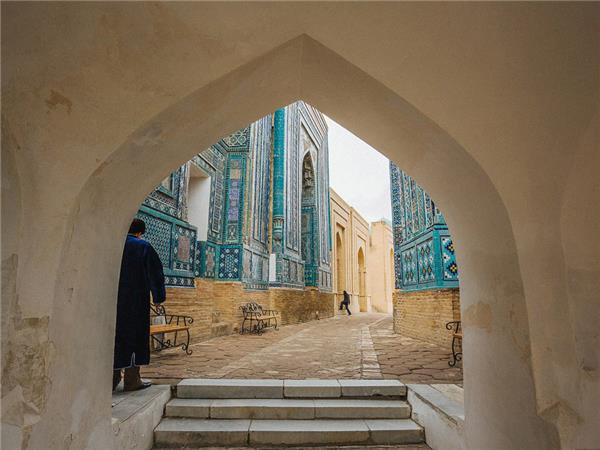
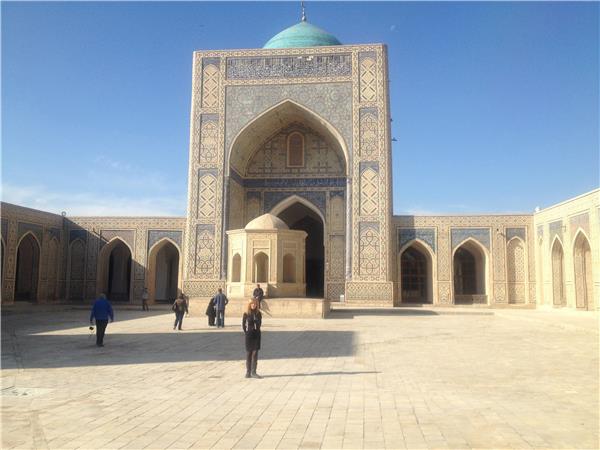
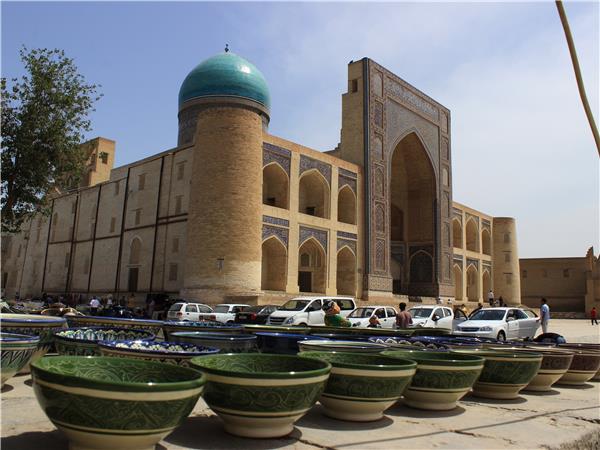
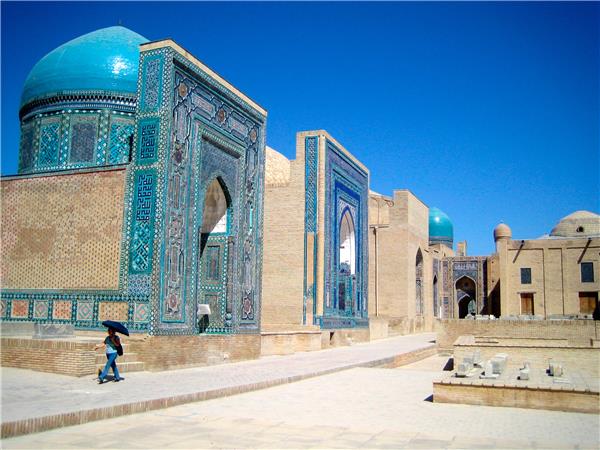
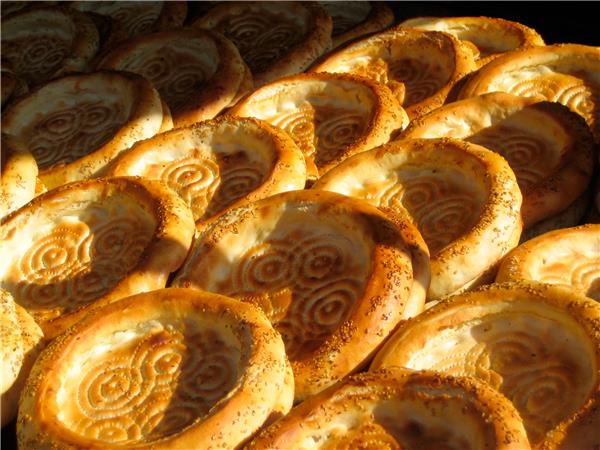
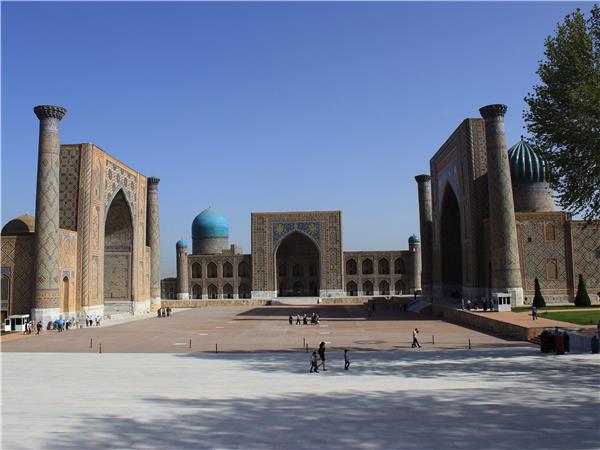
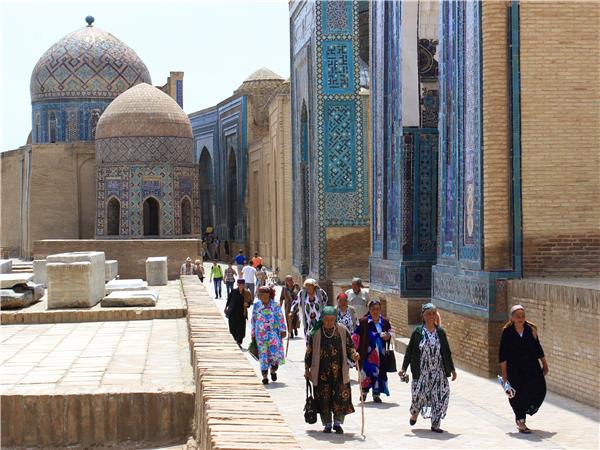
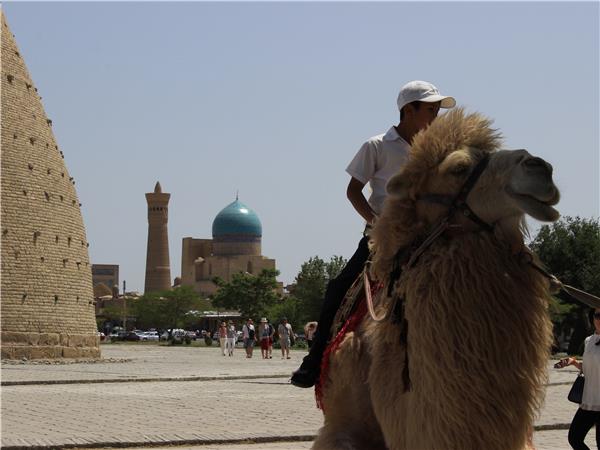
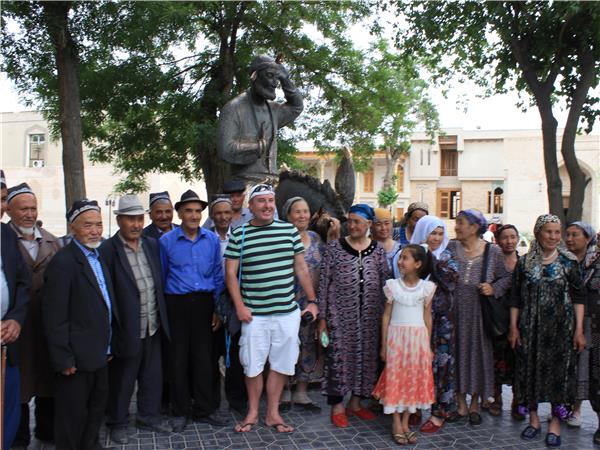
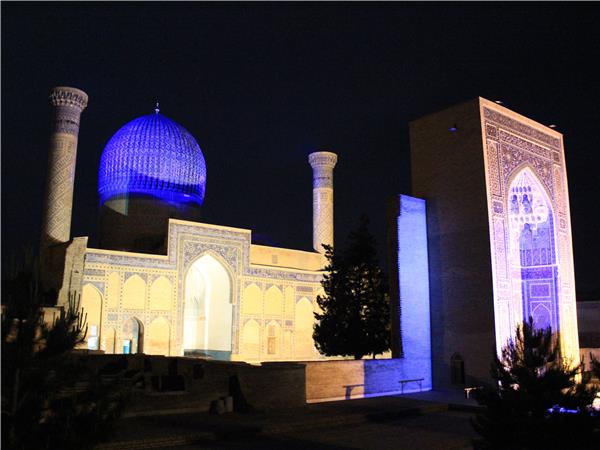
Optional single supplement £235.
Minimum age 16.
Description of Uzbekistan small group tour
A vast, landlocked country in Central Asia, Uzbekistan is the focus of this small group tour. Travelling for 12 days, we’ll discover its centuries of history, from the distant past when nomadic tribes roamed through the region, to the Great Game of the 19th century, when Victorian Britain and Tsarist Russia fought a secret war in the deserts and plains of Central Asia. The famous Silk Road passed through Uzbekistan, connecting China with the Mediterranean, and grand mosques and mausoleums decorated with colourful mosaics pepper the country.
This tour begins in Urgench, our base for exploring Khiva, home to the 12th century fortress of the Khans, Kunya-Ark, and for venturing out onto the arid plains of Khorezm to discover the 2,000 year old ruined city fortress of Toprak-Qala. We’ll take our time in Bukhara – two full days here provide the chance to see some of the city’s over 900 historical monuments. We’ll also explore beautiful Samarkand, often considered the greatest city on the Silk Road. There’s time in the capital, Tashkent, too, for an insight into modern life in Uzbekistan. A night in a traditional yurt used by Kazakh nomads gives even more insight into what life is like for those who live along the Silk Road.
Itinerary
| Day 1: | The adventure begins at our hotel in Tashkent. In the afternoon, we start our sightseeing of this Central Asian capital. This includes visiting Independence Square, which is flanked by public buildings and water fountains, and the Old City, home to mausoleums and bazaar. Tashkent was largely destroyed by earthquakes in the 1960s and was rebuilt in true Soviet style with pleasant leafy boulevards and lots of fountains to cool the summer heat. There are also very interesting museums and mosques. Check-in on arrival is included today for those who arrive on flights in the early hours of the morning. Accommodation: Gabrielle Hotel or Milan Hotel (or similar) |
| Day 2: | In the early morning, we fly to Urgench, our base to visit Khiva and the desert sites. On arrival, we transfer to Khiva and visit the living museum that is the perfectly restored old city. We see the khan's old residence, the Kunya-Ark 12th-century fortress, the tiled base of the never-completed Kalta Minar (which was originally planned to be taller than any minaret in Bukhara) and the beautiful mausoleum of Pakhlavan Makhmud (the patron saint of Khiva). Many wedding parties and pilgrims visit the tomb and drink water from the courtyard well. Please note: On occasions, it may not be possible to secure seats for the group on the flight to Urgench. In this instance, we will buy flights to Nukus instead, and the activities today and tomorrow will be reversed. Additionally - select departures of this trip feature extra inclusions to mark Exodus's 50th year: a visit to the world’s second largest collection of Russian avant-garde art – the Savitsky Museum in Nukus, a local meal at Ayaz Kala and a special edition Exodus kitbag. On these dates we'll fly to Nukus rather than Urgench. Accommodation: Malika Khiva Hotel or Malika Kheivak (or similar) |
| Day 3: | After breakfast, we head to the arid plains of Khorezm, which were once densely populated marshlands, inhabited by Messagetae Scythians. These nomadic horseback archers fought to retain the land, even defeating Persian emperor Cyrus the Great in 529 CE. We visit the 2,000-year-old ruined city fortress of Toprak-Qala, dramatically located with the Sultan Vais mountains as a backdrop. The settlement began in the first century BCE under Kushan patronage and was later devastated by Turkish raids that led to the depopulation of the town in the sixth century. Three large round towers and an impressive portion of the citadel remain, but the parchments and paintings found there are now in St Petersburg's Hermitage Museum. We also visit Qizil-Qala, formerly an important oasis with an impressive amount of remaining buildings, and finally Ayaz-Qala, an imposing hilltop fortress from the sixth century. We later return to Khiva to spend the night. We travel approximately 185 miles (300 km) today, meaning around 6 hours in the vehicle over the course of the day. Accommodation: Malika Khiva Hotel or Malika Kheivak (or similar) |
| Day 4: | Today we take a 6 to 8-hour drive on sometimes poor roads to Bukhara, first crossing the fabled Amu-Darya (Oxus) River and then the Kizilkum Desert. If time allows, we may make a first visit to old Bukhara and have a cup of green tea at the fascinating chai-khana (tea house) at Laby Khauz (one of the water-filled stone pools).We break up the journey today with stops en route. Accomodation: Kavsar Boutique Hotel or Kabir Hotel (or similar) |
| Day 5-6: | We have two days sightseeing in Bukhara, the next of our great Central Asian cities. Bukhara has more than 900 historic monuments, and we spend time visiting many sites and wandering at leisure among the old city streets. Unlike Samarkand, the district of the old town has remained separate from the rest of Bukhara and has undergone lots of restoration and preservation in recent years. In addition to its importance as a trading centre, it is the perfect setting to sit and watch the world go by much as it has done for hundreds of years. Of particular interest is the Fortress Ark where, in the 19th century, the Emir of Bukhara had the English officers Stoddart and Connolly imprisoned and killed, and the mausoleum of Ismail Samani, a beautiful example of early Islamic architecture dating to the 10th century. We also visit the Emir's rather kitsch Summer Palace, the old town with its domed bazaars and khauz (stone pools, which used to be the only water supply for the city), and the attractive 12th-century Char Minar. One of the great landmarks of Bukhara is the Kalyan minaret, known as the death tower, where many an unfaithful wife has met a sticky end. Accommodation: Kavsar Boutique Hotel or Kabir Hotel (or similar) |
| Day 7: | From Bukhara we transfer to Gijduvan, which is renowned for its ceramics school. The skills have been passed from generation to generation and today Gijduvan is home to the sixth generation of potters from the Narzullayevs family. There will be a chance to visit the Museum of Ceramics and perhaps you might like to pick a souvenir at the potter’s shop. We'll be treated to tea and Uzbek sweets here too. Next, we drive to Rabat-i-Malik (a few kilometres before Navoi city) – medieval ruins of the Karakhanid epoch, where we make a short stop. This site was a portal of the caravanserai but sadly much of the rest of the rabat was destroyed in the 1968 earthquake. We'll stop for lunch in Navoi and then drive to our Kazakh yurts. These are traditional round felt tents, which are spacious, colourful and comfortable inside. The Kazakh nomads still use them today. Our camp offers a glimpse into what life was like on the Silk Road and with a bit of luck we will watch a wonderful sunset, and then sit around the fire listening to a local musician (akyn). We'll drive about 180 miles (300 km) today, taking about five hours in total with stops along the way. Accommodation: Yurt camp (three to four people per yurt) |
| Day 8: | Today we walk and there is also the chance to ride camels for a short time towards Aidarkul Lake. The lake stretches through the desert within sight of the Nuratin Mountains; once there, we are free to explore the shoreline or swim. Later, we transfer to Nurata, formerly known as Nur and founded in the third century BCE by Alexander the Great. This ancient town was once regarded as the frontier between the cultivated lands and the steppes, and the ruins of Alexander's hilltop citadel stand testament to its ancient history. The city was also an important Muslim place of pilgrimage, reaching its peak in the 10th century as devotees flocked to its many significant graves and memorials. We stop at a 10th-century mosque and holy sites that have attracted pilgrims from across Central Asia. After a traditional lunch at a teahouse, we drive to Samarkand, a journey of about 215 miles (350 km), taking around five hours. Please note, it is not possible for the whole group to ride camels at the same time due to camel numbers. Accommodation: Dilshoda Hotel or Ideal Hotel (or similar) |
| Day 9: | Samarkand is a jewel of the ancient and modern Silk Road. We have a busy full day, taking in all the sights. There is the exquisite jade mausoleum of Gur-i-Emir, the resting place of Tamerlane, who is now being rapidly reinstated by the Uzbek government as a national hero. Perhaps the greatest treasure is Registan Square, Tamerlane's outstanding creation, a vast complex of domes and minarets, mosques and medrassas. We also visit the equally beautiful necropolis of Shah-i-Zinda and the old observatory of Ulugh Beg, the greatest Muslim astronomer. Samarkand is still a major centre for textiles, carpets and art and is the perfect city to try your bargaining skills and explore the ancient site of the bazaar. Accommodation: Dilshoda Hotel or Ideal Hotel (or similar) |
| Day 10: | This morning is left free for us to enjoy just a little more time in Samarkand. Perhaps visit the local bazaar to sample delicious fresh produce, or maybe return to the many stalls in the Registan Ensemble to find that perfect souvenir. Our adventure in Uzbekistan is almost complete as we leave Samarkand and take a high-speed train back to Tashkent in the late afternoon (please note, the train cannot be guaranteed as occasionally it is booked out by government officials or is unavailable, in which case we will drive instead). Tonight, we have a farewell dinner to mark the end of our travels and reflect on all we have seen. Accommodation: Gabrielle Hotel or Milan Hotel (or similar) |
| Day 11: | The trip ends after breakfast. If you’d like a little more time to explore, speak to your sales representative about extending your stay in Tashkent. |
Map
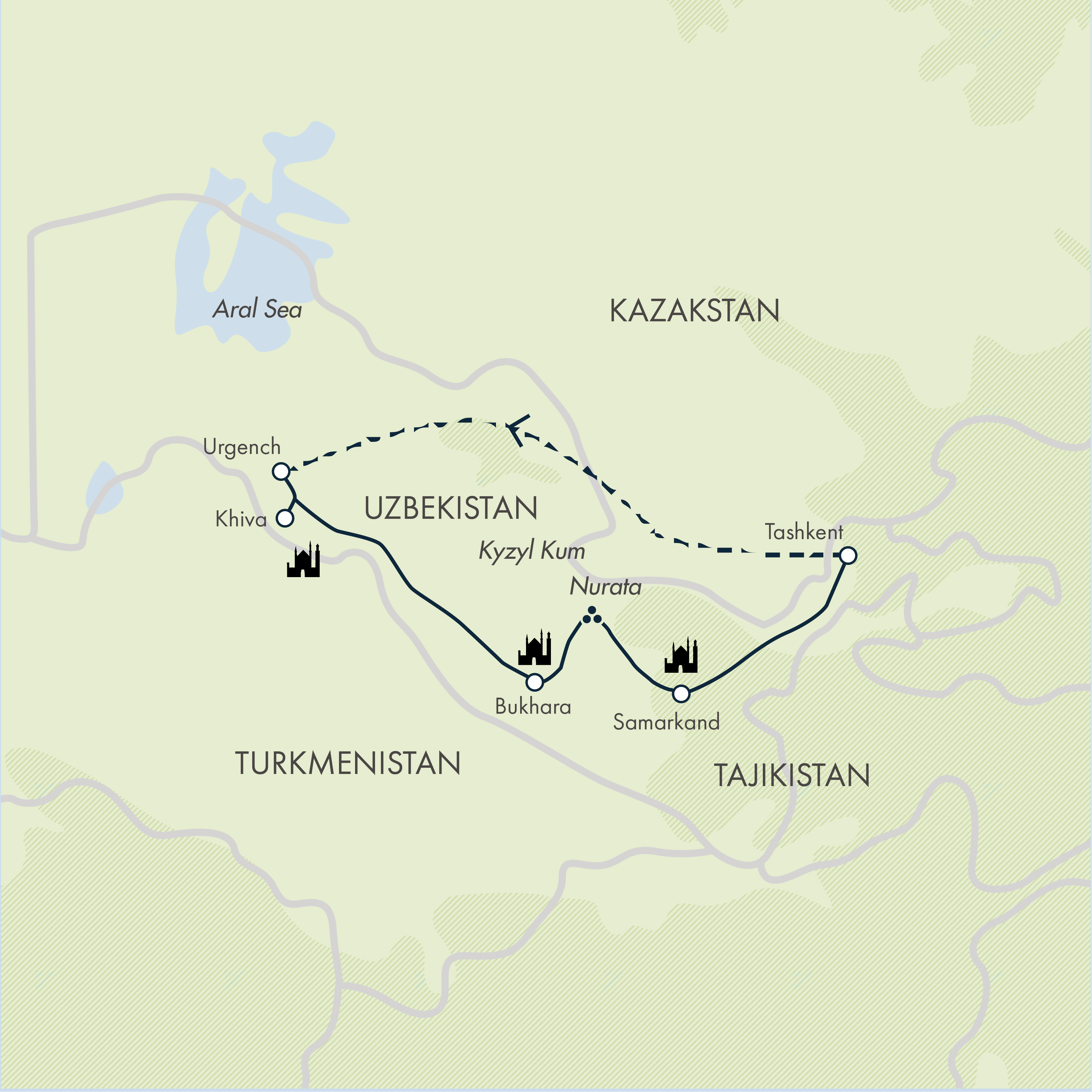
Price information
Check dates, prices & availability
Travel guides
Holiday information
Reviews
7 Reviews of Uzbekistan small group tour
Reviewed on 23 Aug 2018 by Christine Biggs
The UNESCO-listed walled, old city of Khiva, known as Ichon Qala, was the unexpected gem of this trip. Also, swimming in the man-made Lake Aidarkul in the middle of the Kyzylkum desert was a surprising and relaxing pleasure. Read full reviewReviewed on 24 Apr 2018 by Sally-Anne Deards
Visiting the silk road cities of Samarkand, Khiva and Bukhara and having time to wander in each place and admire the reconstructed buildings. The guide Dilshod is extremely knowledgeable and a superb fixer. Uzbekistan is full of architectural surprises and friendly people. I would highly recommend a trip there. Read full reviewReviewed on 16 Oct 2018 by Rosemary Chinchen
Each of the cities visited were very different and interesting and I really enjoyed the night in the Yurt and the camel ride and swim in the lake Read full reviewReviewed on 10 Oct 2018 by Carol Goodwright
There were many highlights and the places we visited were unique and really interesting, but I think the Registan Square in Samarkand will be rated among the top. Read full reviewReviewed on 27 Sep 2017 by Lesley Prosser
The Registan at Samarkand was the most memorable. Everything just led up to that experience. Excellent, mainly due to highly expert and very likable guide Dilshod. Read full reviewReviewed on 26 Jul 2017 by Tamsin Martin
The highlights were the sights. Historical and cultural, the Shah-i-Zinda necropolis was my favourite place, absolutely stunning. Read full reviewResponsible Travel
Planet
Accommodation and Meals:We will be spending 9 nights in standard hotels and 1 night in a yurt camp in Kyzyl-Kum desert. All of our accommodation is predominantly locally owned and staffed, which is beneficial to surrounding communities. The yurt camp is also run by local people and uses very little electricity and water, so this is a reduction to our overall impact on the environment. Where meals are provided, fresh fruit, vegetables and meat are sourced at local farms and markets. Free meal times are a wonderful opportunity to support small bazaar vendors, cafes and authentic, local restaurants. Uzbekistan’s signature dish is a rice dish with meat, carrot and onions called ‘plov’. Also expect varied salads, fresh fruit, Middle Eastern style stews and dumplings from the Far East.
UK Office:
It all starts at home so we have first worked at reducing our carbon footprint in our UK Offices. Through energy conservation measures and recycling policies, we are proud to be actively reducing the waste produced and our impact on the environment. We support various projects all over the world to try and give something back to the places we visit.
Group Size:
This small group tour has a maximum of 16 participants, meaning that we have a low impact on the environments and communities we visit and are able to ensure that we do not disrupt or lead to the displacement of local people. The small number also allows us to stay in unique, family-run hotels that cannot benefit from coach tours and other mass tourism due to their limited sizes.
People
Local Craft and Culture:We explore the many museums and mosques, mausoleums and markets of Tashkent, Khiva, Bokhara and Samarkland. By visiting these cultural and historical sites, we are supporting maintenance, restoration and research. Traditional craftsmanship is evident everywhere we go- from intricate tilework, wooden carvings and patterned textiles, to locally produced delicacies. At the bazaars we visit, Uzbek embroidered products, handmade carpets, painted ceramics and jewellery are all for sale. Not only does buying from market vendors benefit local people and celebrate traditional crafts, but it is a cultural experience in itself! (Expect to haggle). Throughout the journey there are also opportunities to eat dinner with local families in their homes which might be the most valuable cultural experience on offer. The group can sample local, home-cooked food and learn about Uzbek, culture.
A Fair Deal:
We work closely with our local operator to run this trip in a way that aims to reduce impacts and to give as much back as possible to the local communities. Part of this is employing local leaders, who are committed to responsible tourism and helping to preserve the way of life in their area. The leaders will give a briefing on responsible tourism issues to help you understand how you can help reduce your impact and maximise the benefits to the local community from your visit.
Popular similar holidays
Uzbekistan small group holiday
From £1975 - £2175 11 days excluding flights
10 days exploring the Silk Road Treasures of Uzbekistan
The five stans silk road holiday
From £6449 - £6949 23 days including UK flights
Step into the pages of history on a silk road tour
Uzbekistan & Turkmenistan holiday, Silk Road explorer
From £2999 16 days excluding flights
Discover the fascinating ancient history of the Silk Road

















